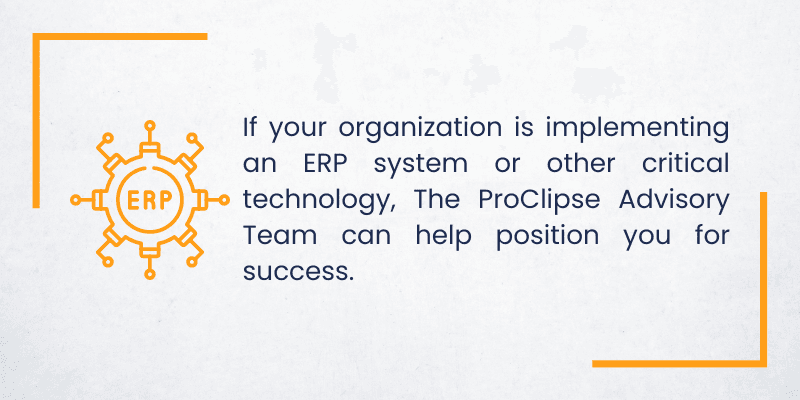

Change Management Blog
What CFOs Need to Know Before Selecting ERP Systems
February 12, 2024
Talal I. El-Assaad: Enterprise Transformation, CX Mastery & Go-to-Market Leadership
Time to Read: 6 Min
What CFOs Need to Know Before Selecting ERP Systems
In the fast-paced world of decision-making and operational workflows, there's a tendency to focus primarily on the technicalities of implementing an Enterprise Resource Planning (ERP) system. However, for CFOs who prioritize the implementation of a cloud-based ERP system, it's important to recognize that its successful deployment involves more than just installation. Ensuring that users are prepared and supportive of the new system is key to realizing the full value of the investment. Understanding and addressing their needs and experiences are crucial for reaping the full benefits of the ERP system.
ERP Change Management
Prosci's research indicates that the success of technology projects, like ERP system implementations, relies heavily on the people using the technology. While choosing the right platform is crucial, it's important to first consider Organizational Change Management (OCM). This involves focusing on the human aspect of the change, addressing how leadership and users will adapt to and support the new system, alongside evaluating business and functional requirements. Prioritizing the people side of change is key to the effective implementation and utilization of any ERP tool.
Ensure alignment around reasons for the ERP system change
When implementing an ERP system, alignment with business objectives is crucial. It's important to understand the reasons for the change, understanding the specific value and improvements the system is expected to bring such as enhancing efficiency, refining processes, or speed to action with faster information.
Calculating the people-side contribution to the ROI, is vital and an important part of the ERP overall project's ROI. The success of the project heavily depends on people adopting and using the new system. This necessitates involving key stakeholders like HR, finance, strategy teams, and Change Management partners early in the process, even before selecting an ERP tool. External stakeholders like vendors and customers should also be considered, as the change might impact them.
This alignment should be established before selecting the ERP tool or implementation partner.
Understand total costs of an ERP system change
As a CFO, when budgeting for an ERP system, it's important to account for not just the software cost but also the expenses involved in integrating the software into your organization. This includes the costs associated with preparing your organization for adoption and effective use of the new system. The total upfront costs should include:
Defining and documenting processes
Like any other process or policy way of working (WOW) change, it's crucial for your organization to have a clear understanding of its current processes. Many organizations may not have this clarity, making it essential to invest time in documenting existing processes. This step is vital to understand how organizational operations and employee work methods will need to adapt with the introduction of the ERP system. Remember, process documentation is key; processes that are only known intuitively or verbally within the organization need to be formally described and recorded.
Prioritizing project time from employees and internal resources
Implementing an ERP system is a substantial investment that needs to yield value to the organization. However, it's common for employees to juggle their regular duties alongside supporting the ERP system implementation. To ensure successful outcomes and benefits, it’s important to prioritize the project. This might involve allocating dedicated time for key personnel to focus on the ERP implementation, separate from their usual job responsibilities. Such prioritization is crucial for the effective and efficient rollout of the system.
Engaging with, preparing and equipping people for the change
Allocating sufficient resources for Change Management is key in transitioning from the current state to the desired future state during an ERP implementation. Experience indicates that involving Change Management late in the process, especially after selecting an implementation partner unequipped to handle the people side of change, often leads to rework and increased costs. Therefore, it's important to integrate Change Management resources early in the process to ensure a smooth transition and effective adoption of the new system.
Integrate processes and people
Successful implementation of significant initiatives like ERP systems requires collaborative efforts across the organization, avoiding silos that can lead to rework and diminish ROI. Integrating Change Management isn't just about adding communication and training as separate components. Effective change involves integrating all aspects of people management into the overall strategy and project plan from the start. This comprehensive approach is key to ensuring successful change and achieving the intended outcomes of the project.
Uncover impacts from an ERP system change
Addressing the human impact of change early in an ERP system implementation fosters trust and engagement, especially vital for organizations with a history of past failures. The impact of implementing an ERP system is widespread, affecting systems, processes, mindsets, and beliefs throughout the organization. Understanding these impacts and proactively managing them is crucial for a successful transition.
Resistance to change is a natural human response, and in the context of ERP implementation, it's expected. Many individuals will show resistance, with some requiring additional support to overcome their hesitations. Recognizing and understanding these impacts early on is key to preparing staff for the transition, managing resistance effectively, and ensuring readiness for the system's go-live. Addressing these challenges head-on contributes to a smoother change process.
Organizations often underestimate the significant mindset shift required when transitioning to an ERP system. It's not uncommon for employees to face challenges when moving to a self-service model, particularly if they have been accustomed to receiving key information and reports from others. Recognizing this potential hurdle and providing the necessary support and training to help employees make a smooth transition is crucial for a successful ERP implementation.
The Critical Mistake CFOs Make
With ERP Systems
As mentioned earlier, one common mistake that leaders often make is relying too heavily on communications and functional training when implementing a massive technology project like an ERP system migration or other technical implementation.
Implementing a new ERP system is a highly disruptive change that can be likened to replacing an organization's nervous system. It fundamentally alters the way people think, process information, and perform their job tasks. Moreover, it's often just one of several changes happening simultaneously within the organization. Therefore, it's crucial to recognize that an ERP implementation isn't solely a technology change.
This highlights the importance of addressing the people side of change before engaging with an implementation partner. If the vendor is not equipped to consider the full scope of changes across the organization, they may attribute any failures solely to training. However, the reality is often that the organization did not adequately prepare its leaders to equip their teams with the necessary skills, understanding of the impending changes, and support during their transitions.
To learn more about the benefits of ERP Change Management.
RelatedBlog Articles
The Critical Role of Sponsorship in Women Leadership
9 Key Change Management Tips for Implementation Success
CLARC Role




